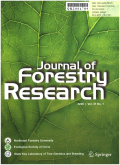- 钛学术文献服务平台 \
- 学术期刊 \
- 农业科学期刊 \
- 林业期刊 \
- 林业研究(英文版)期刊 \
Drought stress,mercuric chloride,and β-mercaptoethanol effects on hydraulic characteristics of three cultivars of wolfberry(Lycium chinense)
Drought stress,mercuric chloride,and β-mercaptoethanol effects on hydraulic characteristics of three cultivars of wolfberry(Lycium chinense)
基本信息来源于合作网站,原文需代理用户跳转至来源网站获取
摘要:
In order to further understand the effects of drought stress on hydraulic characteristics and the rela-tionship between hydraulic conductivity and aquaporins or water channels of root systems of three wolfberry cultivars(Lycium chinense Mill.),hydraulic conductivity of 2-year-old pot-grown seedlings was measured under drought stress,rewatering,and treatment with exogenous mercuric chloride and β-mercaptoethanol.Under moderate and severe drought stress levels,the most significant decrease of hydraulic conductivity was 37.3% and 24.0%,respec-tively,in the 'Ningqi 5' cultivar compared with the non-stressed control.After rewatering,the rate of recovery in specific conductivity was most rapid in the 'Mengqi 1'cultivar,at 0.058 and 0.072 kg MPa-1 m-2 s-1 h-1 under moderate and severe drought stress levels,respectively.The 'Mengqi 1' cultivar had the highest recovery degree of hydraulic conductivity under two concentrations of β-ME(500 or 1000 μmol L- 1),reaching 82.4% and 88.5%,respectively,of the initial conductivity.The adaptive capacity of hydraulic conductivity in the 'Ningqi 5' culti-var was weaker than in the 'Ningqi 1' and 'Mengqi 1'cultivars under drought stress.The recovery capacity of hydraulic conductivity in 'Mengqi 1' cultivar was stronger than the 'Ningqi 1' and 'Ningqi 5' cultivars after rewa-tering.Aquaporins of the 'Ningqi 1' cultivar root systems had the highest binding affinity with mercuric chloride,which was the most likely cause in the decrease in hydraulic conductivity,whereas aquaporins of 'Mengqi 1'root systems had the weakest binding affinity.The inhibi-tory effect of mercuric chloride was readily eliminated byβ-mercaptoethanol in the 'Mengqi 1' cultivar.The hydraulic characteristics of this cultivar were more sensi-tive to drought,mercuric chloride and β-mercaptoethanol than the other cultivars.

推荐文章
Effects of a proline solution cover on the geochemical and mineralogical characteristics of high-sul
Proline
Coal gangue
Pollution control
Heavy metal fraction
Mineralogical characteristics
Effects of mineral-organic fertilizer on the biomass of green Chinese cabbage and potential carbon s
Potassic rock
Carbonate
Karst
Ion chromatograph
Carbon sequestration
Source and composition of sedimentary organic matter in the head of Three Gorges Reservoir: a multip
Three Gorges reservior
Sedimentary organic matter
δ13C
Lignin phenols
Lipid biomarkers
Carbon dioxide emissions from the Three Gorges Reservoir, China
CO2 emissions
Three Gorges Reservoir
River-type reservoir
内容分析
关键词云
关键词热度
相关文献总数
(/次)
(/年)
引文网络
引文网络
二级参考文献 (157)
共引文献 (31)
参考文献 (30)
节点文献
引证文献 (0)
同被引文献 (0)
二级引证文献 (0)
1952(1)
- 参考文献(0)
- 二级参考文献(1)
1967(1)
- 参考文献(0)
- 二级参考文献(1)
1972(1)
- 参考文献(0)
- 二级参考文献(1)
1976(1)
- 参考文献(0)
- 二级参考文献(1)
1986(1)
- 参考文献(0)
- 二级参考文献(1)
1988(2)
- 参考文献(0)
- 二级参考文献(2)
1989(1)
- 参考文献(0)
- 二级参考文献(1)
1990(3)
- 参考文献(0)
- 二级参考文献(3)
1991(2)
- 参考文献(0)
- 二级参考文献(2)
1992(5)
- 参考文献(0)
- 二级参考文献(5)
1993(7)
- 参考文献(0)
- 二级参考文献(7)
1994(6)
- 参考文献(0)
- 二级参考文献(6)
1995(7)
- 参考文献(2)
- 二级参考文献(5)
1996(5)
- 参考文献(1)
- 二级参考文献(4)
1997(4)
- 参考文献(0)
- 二级参考文献(4)
1998(8)
- 参考文献(1)
- 二级参考文献(7)
1999(12)
- 参考文献(0)
- 二级参考文献(12)
2000(14)
- 参考文献(0)
- 二级参考文献(14)
2001(8)
- 参考文献(3)
- 二级参考文献(5)
2002(9)
- 参考文献(2)
- 二级参考文献(7)
2003(8)
- 参考文献(1)
- 二级参考文献(7)
2004(6)
- 参考文献(2)
- 二级参考文献(4)
2005(16)
- 参考文献(7)
- 二级参考文献(9)
2006(6)
- 参考文献(2)
- 二级参考文献(4)
2007(18)
- 参考文献(2)
- 二级参考文献(16)
2008(9)
- 参考文献(0)
- 二级参考文献(9)
2009(4)
- 参考文献(0)
- 二级参考文献(4)
2010(1)
- 参考文献(0)
- 二级参考文献(1)
2011(4)
- 参考文献(2)
- 二级参考文献(2)
2012(4)
- 参考文献(0)
- 二级参考文献(4)
2013(4)
- 参考文献(2)
- 二级参考文献(2)
2014(1)
- 参考文献(1)
- 二级参考文献(0)
2015(1)
- 参考文献(0)
- 二级参考文献(1)
2016(4)
- 参考文献(1)
- 二级参考文献(3)
2017(1)
- 参考文献(0)
- 二级参考文献(1)
2018(2)
- 参考文献(1)
- 二级参考文献(1)
2021(0)
- 参考文献(0)
- 二级参考文献(0)
- 引证文献(0)
- 二级引证文献(0)
引文网络交叉学科
相关学者/机构
期刊影响力
林业研究(英文版)
主办单位:
东北林业大学
中国生态学学会
出版周期:
双月刊
ISSN:
1007-662X
CN:
23-1409/S
开本:
大16开
出版地:
哈尔滨市动力区和兴路26号(林大123信箱)
邮发代号:
创刊时间:
1990
语种:
eng
出版文献量(篇)
2459
总下载数(次)
1
总被引数(次)
7852
期刊文献
相关文献
推荐文献
- 期刊分类
- 期刊(年)
- 期刊(期)
- 期刊推荐
林业研究(英文版)2022
林业研究(英文版)2021
林业研究(英文版)2020
林业研究(英文版)2019
林业研究(英文版)2018
林业研究(英文版)2017
林业研究(英文版)2016
林业研究(英文版)2015
林业研究(英文版)2014
林业研究(英文版)2013
林业研究(英文版)2012
林业研究(英文版)2011
林业研究(英文版)2010
林业研究(英文版)2009
林业研究(英文版)2008
林业研究(英文版)2007
林业研究(英文版)2006
林业研究(英文版)2005
林业研究(英文版)2004
林业研究(英文版)2003
林业研究(英文版)2002
林业研究(英文版)2001
林业研究(英文版)2000
林业研究(英文版)1999

 免费查重
免费查重










